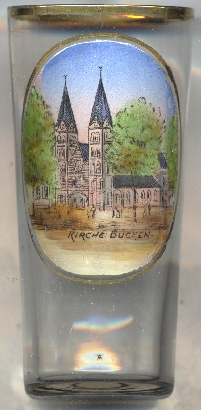

|
| DEUTSCHLAND | GERMANY |
| Bundesland: Niedersachsen | Lower Saxony |
| Landkreis: Nienburg / Weser |
 Bücken is situated at an elevation of 18 m in the district Nienburg, about 40 km southeast of Bremen
and about 50 km northwest of Hannover. The municipality has a population of about 2,100 (2021).
Bücken is situated at an elevation of 18 m in the district Nienburg, about 40 km southeast of Bremen
and about 50 km northwest of Hannover. The municipality has a population of about 2,100 (2021).
An abbey was established here in 882 AD by the archbishop of Bremen. The abbey was intended to serve as a mission centre. Bücken also served the archbishops as a place of refuge, for example in the Viking raids of the 10th century. Altenbücken, today part of Bücken, was already mentioned in 860. Around 1200, the monastery was one of the richest tax collectors in northern Germany thanks to numerous donations. In 1413, the village obtained the privilages of a market town from the counts of Hoya. Since 1974 Bücken is part of the Samtgemeinde (joint municipal association) Grafschaft Hoya, which also contains the municipalities Eystrup, Gandesbergen, Hämelhausen, Hassel, Hoya, Hilgermissen, Hoyerhagen, Schweringen and Warpe.
The former  abbey church of St. Maternianus and St. Nicholas [left, no. 4322],
popularly called the Bücker Dom, is a Romanesque basilica from the 11th and 12th centuries. Nothing certain is known about the original,
presumably wooden church of the 9th century, which must have been built when the abbey was founded in 882. The four eastern bays of the nave
date from the 11th century, the two western bays of the nave and the lower parts of the two towers from the 12th century. The vaulting
of the nave was presumably created after 1350. In 1802 the north tower was demolished except for the two lower floors. The simplifying modifications
of the 18th century were reversed between 1863 and 1868 by the architect Adelbert Hotzen in a comprehensive historical restoration (south tower,
upper floors of the north tower, west porch and gable), in which the collegiate church largely received its current form.
abbey church of St. Maternianus and St. Nicholas [left, no. 4322],
popularly called the Bücker Dom, is a Romanesque basilica from the 11th and 12th centuries. Nothing certain is known about the original,
presumably wooden church of the 9th century, which must have been built when the abbey was founded in 882. The four eastern bays of the nave
date from the 11th century, the two western bays of the nave and the lower parts of the two towers from the 12th century. The vaulting
of the nave was presumably created after 1350. In 1802 the north tower was demolished except for the two lower floors. The simplifying modifications
of the 18th century were reversed between 1863 and 1868 by the architect Adelbert Hotzen in a comprehensive historical restoration (south tower,
upper floors of the north tower, west porch and gable), in which the collegiate church largely received its current form.
[https://de.wikipedia.org/wiki/B%C3%BCcken, https://en.wikipedia.org/wiki/B%C3%BCcken;
https://de.wikipedia.org/wiki/Stiftskirche_St._Materniani_et_St._Nicolai]
![[scale]](lineal.jpg)